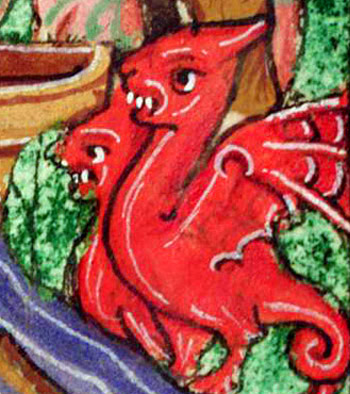Sir Tristrem
General Information
Plot Summary

Roland Riis of Armenia conceives a child with Blauncheflour, sister of King Mark of England. When Roland is slain, Blancheflour dies in childbirth, entrusting their son Tristrem to Roland’s ally Rohand, along with an English ring. Rohand raises the child, teaching him to read, play music and hunt, until Tristrem is abducted by merchants and put ashore in England. He arrives at the court, where he impresses Mark with his skills in hunting and music.
Rohand follows Tristrem to England and reveals his parentage, presenting the ring as proof. Mark knights Tristrem, who travels to Armenia to avenge his father. Returning two years later, he finds the English preparing a tribute of one hundred children for the Irish giant Moraunt. Horrified, Tristrem sails to Ireland and defeats Moraunt, leaving a fragment of his sword in his brain. He returns to England, where his wounds do not heal. After three years he sets sail again with his musical instruments.
Washed ashore at Dublin, he claims to be a merchant called Tramtrist. The Irish queen heals him, while he teaches music to her daughter Ysonde. After a year he returns to England, where Mark resolves to marry the beautiful Irish princess. Tristrem travels back to Ireland and defeats a ferocious dragon, but is poisoned when he takes its tongue as a trophy. He recovers at the Irish court, where Ysonde recognises him and, seeing his broken sword, realises that he killed Moraunt, her uncle. When Tristrem offers to make her queen of England, however, her family agree to send her to Mark.
During their return voyage, Tristrem and Ysonde accidentally drink a love potion prepared by her mother. Consumed by passion, they spend the journey together, accompanied by a dog that licks the cup. When they arrive, Ysonde marries Mark but her maid Brangwein replaces her in their marriage bed: Ysonde plots to kill Brangwein, but the maid proves her loyalty and is spared. An Irish earl disguised as a minstrel abducts Ysonde and Tristrem uses his own music to rescue her. They spend seven days together before returning to Mark.
A dwarf called Meriadok discovers their affair and arranges for Mark to overhear a tryst, but the lovers convince the King of their innocence. Meriadok perseveres, and when Tristrem’s blood is found on Ysonde’s bed, he is banished and the queen is sentenced to trial by ordeal. On her way to Westminster Tristrem, disguised as a beggar, deliberately lifts Ysonde’s skirts: she passes the trial by truthfully stating that only her husband and the beggar have touched her.
Tristrem delivers Wales from a giant and is summoned back to Mark’s court. This time the lovers are less careful and Mark banishes them both. They live happily in the forest, until Mark visits and Tristrem places a sword in the middle of their bed. Convinced that their love is chaste, he (Mark) invites them back into the court. But when Meriadock catches them again, Tristrem flees to Brittany, taking Ysonde’s ring. He marries the duke’s daughter, also called Ysonde, but avoids sleeping with her. He defeats another giant, who helps him build a palace in honour of his true love, decorated with scenes from their story. Ganhardin, his wife’s brother, is initially enraged, but agrees to help Tristrem when he falls in love with the image of Brangwein.
They travel to England, where they outwit Mark’s constable. After visiting Ysonde in disguise, Tristrem defeats his enemies in a tournament. He and Ganhardin return to Brittany, where Tristram agrees to help a young knight. His old wound [becomes infected, and when the Bretons fail to heal him, he asks Ganhardin to fetch Ysonde. His jealous wife, however, convinces him that she has refused to come. Tristrem dies of grief; Ysonde arrives shortly afterwards and dies at his bedside.]
From: Alan Lupack ed. Lancelot of the Laik and Sir Tristrem. Kalamazoo, Michigan: Medieval Institute Publications, 1994.
Manuscript: Edinburgh, National Library of Scotland, MS Advocates 19.2.1 (Auchinleck)
Manuscripts
Click a title below to search for all romances in that manuscript.